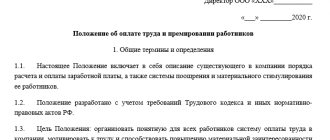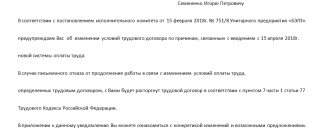Electronic work books
From January 1, all Russian employers can maintain paper and electronic work books for employees. Such changes are prescribed in the Labor Code of the Russian Federation. Each employee will choose their own work format during 2020. All employers will have to notify each employee of these changes by July 1, 2020 and obtain the employee’s signature on the notice. And workers will be able to submit an application to switch to electronic labor until December 31.
The form for notifying an employee about the transition to an electronic work book was developed by the Pension Fund of Russia, but a free form can also be used. The main thing is to be sure to analyze the local acts of the organization and promptly make changes to existing employment contracts and the collective agreement; internal labor regulations and HR service regulations. Employees need to be familiarized with new editions of local regulatory documents.
Anyone who finds a job for the first time in 2021 will not need to issue paper work books. Only electronic ones are provided for them. Information on labor activity until 2020 for those who decide to switch to an electronic form will not be transferred to the ETC, and the paper book will need to be returned with a personal signature.
New monthly report to the Pension Fund of Russia
In connection with the transition to the ETC, employers have new obligations to submit a new monthly SZV-TD report to the Pension Fund. The Pension Fund of Russia developed the report form at the end of last year. In fact, this is the maintenance of workers’ work books in electronic form (Federal Law dated December 16, 2019 No. 436-FZ). At the same time, the report must include the data of all employees, and not just those who refused paper work.
Information on the work activities of employees using this form will need to be submitted no later than the 15th day of the month following the reporting month. The report must contain information:
- about hiring,
- about moving,
- about dismissal;
- on an application for choosing a paper or electronic work record book.
If none of these events occurred during the month, there is no need to submit information on a specific employee to the Pension Fund for the current month. Information about hiring and dismissal will need to be submitted to the Pension Fund within three days from the date of the event, but only from 2021. So far only the SZV-TD form.
Difficulties in finding and retaining specialists
According to experts, the labor market in Russia remains a candidate market, and it is still dominated by inactive candidates who do not start looking for work on their own. Therefore, employers have to significantly increase the level of compensation or pay much more attention to developing their HR brand among technical professionals.
The search for candidates for vacancies in software development, software testing, and Devops, even among the largest players in the market with strong brands, according to Hays, takes at least 1.5–2 months. For team lead positions and above, the closure period reaches in some cases up to six months.
Due to staff shortages, salaries of IT specialists in Russia are steadily growing by 5-10%
At the same time, employers are not inclined to reduce the requirements for the qualifications of hired specialists. Companies prefer to continue searching for professionals with knowledge and experience, rather than compromising and accepting candidates with competency deficits for further training. Companies often refuse to offer jobs to specialists who are not sufficiently informed about the goals of the project and the employer’s expectations. Hays explains this by the reluctance of project managers to take the position of “salesmen” in front of candidates, luring them into the project.
Valuable specialists are increasingly retained through counteroffers, that is, by making a counteroffer to an employee who has expressed his intention to leave the company. In the most popular areas (development, big data, e-commerce), salaries have increased over the past year by approximately 10–15%.
Among the technologies used in development, Java, Python, C++, C# on the backend and the React (Javascript) framework on the frontend remain popular. At the same time, a number of companies continue to use old versions of languages and frameworks that candidates do not want to work with. Companies using the most modern versions also experience difficulties in recruiting staff, since there are not enough candidates on the market with experience in working with the latest versions.
Fines for HR officers for personal data
Every employer, due to legal requirements, is in any case obliged to collect, store, transfer personal data, that is, to process it. In this regard, in practice, he is recognized as the operator of personal data, regardless of other circumstances. Typically, the official responsible for handling personal data is the personnel officer or the manager personally.
At the end of 2020, amendments were made to the Code of Administrative Offenses of the Russian Federation aimed at strengthening measures of administrative liability for violations in the field of data processing and information dissemination. A separate offense includes failure by the operator to fulfill the obligation to ensure recording, systematization, accumulation, storage, clarification (updating, changing), retrieving personal data of citizens using databases located on the territory of the Russian Federation. And this directly applies to all employers who store information about their employees and clients in electronic form.
For violation, a fine is established in the amount of:
- for citizens - from 30,000 to 50,000 rubles;
- for officials - from 200,000 to 500,000 rubles;
- for legal entities - from 2 million to 6 million rubles.
For repeated violations, the fines will be higher:
- for citizens - from 50,000 to 100,000 rubles;
- for officials - from 500,000 to 1 million rubles;
- for legal entities - from 6 million to 18 million rubles.
Uniting approaches
Large companies, as a rule, implement their own strategies for building corporate training, but with the involvement of educational organizations, states UrFU Deputy Vice-Rector for Academic Affairs Oleg Rebrin
Deputy Vice-Rector of UrFU for Academic Affairs Oleg Rebrin
— To develop the competencies required by production, either our own educational resources, or third-party organizations or individual specialists are used. The most common option is a combination of these approaches. Corporate training is carried out in-house at enterprise training centers; it is aimed mainly at advanced training and professional retraining of workers. Such systems are well organized and work efficiently. Advanced training of mid-level specialists is carried out using both their own competence carriers and other invited specialists, including educational organizations. This option builds interaction between UrFU and industrial enterprises of the region. First of all, these are short-term programs ordered to develop certain competencies, both in the field of soft skills and in the field of specialized professional competencies. The university most widely implemented such programs within the framework of the Presidential Program for Advanced Training of Engineering Personnel with the support of the Ministry of Education and Science of the Russian Federation and co-financing of enterprises. In 2012 - 2014, over 600 specialists from enterprises in the region completed training under UrFU programs.
Further training programs are formed according to customer requirements with the direct participation of enterprise employees. This allows you to define the request as accurately as possible and achieve the result.
The training of engineering personnel for enterprises is in most cases carried out in universities. The most common option is targeted training for graduates at the request of enterprises. There are well-known problems in this process: insufficient motivation of applicants for successful training, preferences for admission, which often result in poor initial preparation of applicants, large dropout rates in junior years of study, etc. UrFU has positive experience in overcoming these problems. Thus, for bachelor’s degrees, special programs are created on special orders for certain groups of “target students”. They involve an increased amount of practice up to the acquisition of working professions, the interested and motivating participation of enterprise specialists in both the formation and implementation of the program, the formulation and solution of real production problems, and much more. An effective option for targeted training is the state program “New Personnel for the Defense Industry”, according to which special modules are implemented for graduate students that develop in-demand competencies.
Our experience in building engineering master’s programs is interesting, for which small teams of employees come from enterprises to study. They already have experience in production activities and are familiar with real problems, which they try to solve during the training process. In fact, a high-level model of dual training is being implemented - combining study with work at an enterprise.
The introduction of professional standards has led to an increase in the interest of enterprises in training programs for advanced training, professional retraining and master's degrees. Having experience in the transition to new educational standards, also related to professional standards, we prepare and implement popular educational programs of this type.
New production calendar
In the middle of last year, by resolution No. 875 dated July 10, 2019, the Government of the Russian Federation approved a new production calendar for 2020. Out of 366 calendar days (leap year), there will be 248 working days, 118 weekends and holidays.
The transfer of weekends and holidays has been established, the number of shortened working days, and the features of work and rest in a standard five-day and six-day work week have been determined. Employers are required to use the production calendar to plan and schedule work.
Electronic applications and personnel documents
In accordance with amendments to the Labor Code of the Russian Federation, the exchange of electronic applications between employees and the employer will be allowed. Until now, employers could only accept such electronic applications and documents from remote workers. They needed a “living signature” on the remaining documents, otherwise there was a risk that the application would be invalidated.
Whether or not to introduce electronic personnel document management in an organization will be decided by employers themselves. If the relevant order is issued, applications can be translated into electronic form:
- about hiring;
- about dismissal;
- on granting leave;
- other personnel documents.
The employee will need an electronic signature, which can be obtained free of charge on the government services website. The exchange of documents will take place via the email address specified by the employee.
HR NEWS
From the same date, amendments to the Model Internal Labor Regulations will come into effect. The changes are due to the entry into force of the updated Labor Code of the Republic of Belarus.
The amendments made to the Model Internal Labor Regulations relate to the hiring and dismissal of employees, the responsibilities of the employee and the employer.
The document clarifies the definition of the term “working time”, expands the list of disciplinary measures for committing a disciplinary offense, and defines cases of application and non-application of such measures.
Source:
Resolution of the Ministry of Labor and Social Protection of the Republic of Belarus dated November 21, 2019 No. 60 “On amendments to the resolutions of the Ministry of Labor of the Republic of Belarus dated December 27, 1999 No. 155 and dated April 5, 2000 No. 46” (comes into force on January 28, 2020)
The directory “Positions and professions for the purposes of professional pension insurance” includes new positions:
- "dredger sailor";
- “control and protection system engineer for a nuclear research facility”;
- "medical physicist";
- "Senior General Practitioner Nurse"
The activity codes for professions have changed:
- “Logging station operator”;
- “installer of instruments and automation systems”;
- "cook".
Source:
Resolution of the Board of the Social Protection Fund of the Ministry of Labor and Social Protection of the Republic of Belarus dated December 18, 2019 No. 14 “On amending the Resolution of the Board of the Social Protection Fund of the Ministry of Labor and Social Protection of the Republic of Belarus dated May 31, 2011 No. 5” (came into force on January 5, 2020)
A permit to allow a vehicle to participate in road traffic is included in the list of documents that the driver of a power-driven vehicle must have with him and submit for inspection to traffic police officers.
The following are excluded from the list of documents submitted by an individual to obtain permission to allow a vehicle to participate in road traffic:
- permission from the communications authority for the right to use the radio frequency spectrum when operating radio-electronic equipment - if they are present on the vehicle;
- medical certificate of health.
These requirements apply directly to individuals.
In relation to legal entities, the procedure for issuing a permit will change only after the legislative acts are brought into compliance with the requirements of the Decree.
Source:
Decree of the President of the Republic of Belarus dated December 30, 2019 No. 492 “On amending the decrees of the President of the Republic of Belarus” (came into force on January 2, 2020); website of RUE "Beltekhosmot"
Major changes in the responsibilities of the employer and employee:
- The practice is legally established according to which, when carrying out work and operating equipment, the employer appoints those responsible for the organization and safe execution of work. Such officials are not only responsible for organizing labor protection, but also monitor compliance by employees with labor protection requirements in the organization and structural divisions, as well as when performing certain types of work;
- the costs of medical examinations of employees, as well as persons hired, will be borne by the employer. If a preliminary mandatory medical examination is paid for by the candidate for a vacant position, his costs are compensated by the employer after hiring;
- the actions of an employee working under a civil contract in places provided by the employer are specified if the employee exercises his right to refuse to perform work when there is an immediate danger to his life and health. In case of refusal on the specified grounds, the employee is obliged to immediately inform the employer in writing about the reasons for the refusal;
- the possibility of pre-trial consideration of disagreements regarding the investigation of industrial accidents is established. If the employer refuses to conduct an investigation, draw up a report on an industrial accident, or there is a discrepancy between the circumstances set out in such a report and the actual circumstances, the worker who received a work injury will have the right to contact the Department of State Labor Inspection of the Ministry of Labor and Social Protection, its separate territorial divisions, or directly to court.
Source:
Law of the Republic of Belarus dated December 18, 2019 No. 274-Z “On amendments to the Law of the Republic of Belarus “On Labor Protection” (comes into force on June 28, 2020)
The Ministry of Construction and Architecture has developed a draft resolution that revises the qualification requirements for managers and specialists of organizations operating in the field of architectural, urban planning, construction activities, performing work on the inspection of buildings and structures, upon receipt of qualification certificates.
The definition of the term “applicant” is planned to be stated in a new edition, clarifying that this is a specialist applying for a qualification certificate in accordance with the position held according to the staffing table, having the appropriate professional education and work experience in the certification specialization. Such clarification will comply with the requirements of the Labor Code.
It is also proposed to clarify the cases in which the issue of termination of certificates of conformity is considered.
Source:
draft resolution of the Council of Ministers of the Republic of Belarus “On amending the resolution of the Council of Ministers of the Republic of Belarus dated March 21, 2014 No. 252”, published on the Legal Forum of Belarus
Deputy Minister of Labor and Social Protection Valery Kovalkov spoke about delayed retirement bonuses on the ONT TV channel.
As an example, he cited pension payments for a man with 30 years of work experience and the national average salary. In a standard situation, the pension amount is 368 rubles, and if you refuse payments for 5 years - 706 rubles. “On average, a man receives a pension for 16 years, and a woman – 26 years. This five-year period in the general period of receiving a pension is not so significant,” noted V. Kovalkov.
The Deputy Minister recalled that from January 1 of this year. The retirement age has increased by six months and is now 62 years for men and 57 years for women.
A prerequisite for the appointment of an old-age pension is the presence of an insurance period (with payment of contributions to the Social Security Fund) of at least 17.5 years. For certain categories of citizens (mothers of large families, disabled children, parents of disabled children, etc.), the insurance period is 5 years. There are also benefits for those who have cared for disabled children, group I disabled people, and people over 80 years of age for a long time.
Source: BELTA
The creation from January 1, 2020 by executive committees of the regional and basic levels of new government institutions (centers) is provided for by Decree of the President of the Republic of Belarus dated December 23, 2019 No. 475 “On ensuring the activities of budgetary organizations.”
The government has established the number of employees at the centers, the conditions for introducing staff positions, as well as the amounts of allowances and additional payments. Changes in the number and names of positions (professions) may be made to the staffing table, in agreement with the local executive committee, which is in charge of the center.
According to general rules:
- when approving the staffing table for calculating the number of employees, indicators for the implementation of activities by organizations and the center, incl. generating income, are accepted on January 1 of the calendar year;
- approval of the structure and staffing of the center is carried out within the limits of the funds allocated to the center for wages in the relevant local budget.
Source:
Resolution of the Council of Ministers of the Republic of Belarus dated December 31, 2019 No. 948 “On the implementation of the Decree of the President of the Republic of Belarus dated December 23, 2020 No. 475” (came into force on January 1, 2020)
The norm on the need to form metrological services of government agencies, organizations subordinate to them, other legal entities or individual entrepreneurs, or on the appointment of responsible persons for coordinating activities to ensure the uniformity of measurements is enshrined in the new edition of the Law of the Republic of Belarus “On Ensuring the Uniformity of Measurements”.
To support this process, a new type of activity is provided - metrological audit, which can be used by organizations as a voluntary procedure. The introduction of this procedure will make it possible to attract the most qualified metrologists to transfer new knowledge and competencies in the field of ensuring the uniformity of measurements directly into the production environment.
Source:
Law of the Republic of Belarus dated November 11, 2019 No. 254-Z “On amending the Law of the Republic of Belarus “On Ensuring the Uniformity of Measurements” (comes into force on November 27, 2020); press service of Gosstandart








